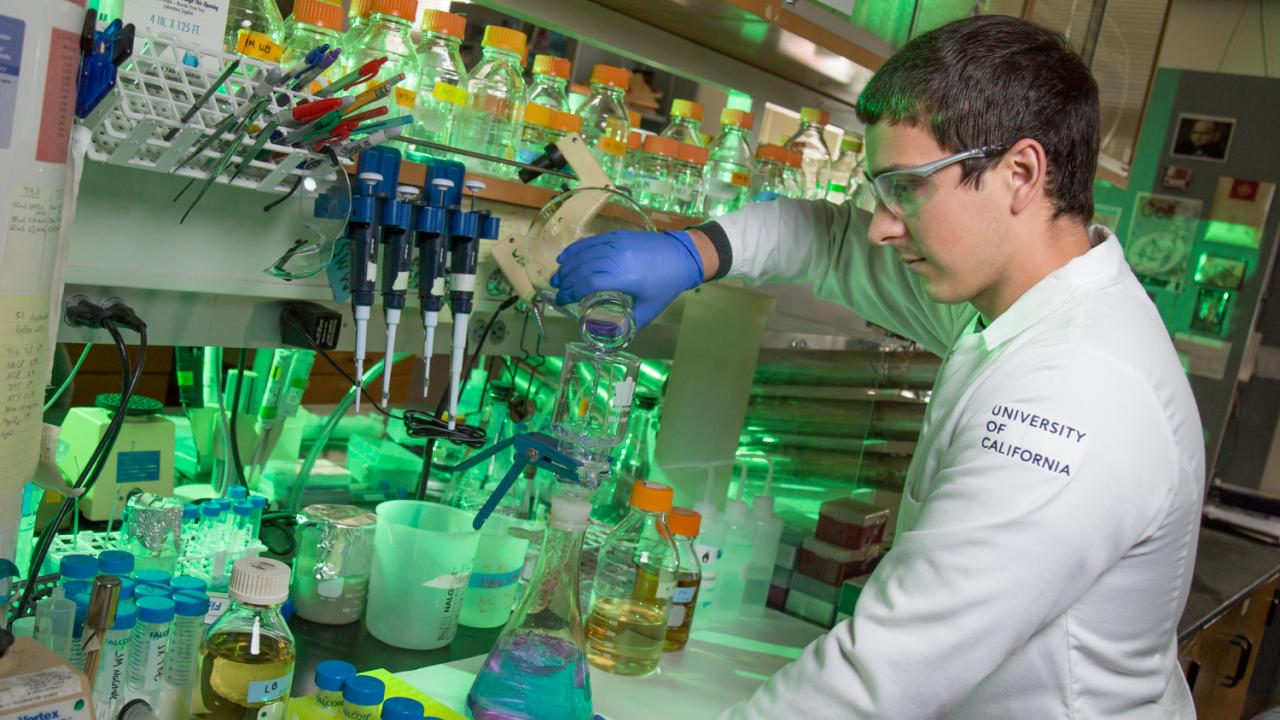
Passion for Research Leads to Baskin Award for Benjamin Mallory
“Ben is not only very enthusiastic, working long hours in the laboratory, he also has an excellent understanding of the science underpinning the experiments he is conducting,” said Heyer. “He has a great trajectory ahead of him.”
When Wolf-Dietrich Heyer interviewed Benjamin Mallory for an undergraduate research position in the Heyer Lab almost two years ago, he noticed something about the transfer student from Butte College near Chico, Calif. A spark in the eyes, an unbridled enthusiasm.
“My key goal for undergraduates is to instill excitement about science, and Ben certainly caught the bug,” said Professor Heyer, Department of Microbiology and Molecular Genetics. “Very few of my undergraduate students choose biochemistry for their research project, as it requires more attention to detail and longer time blocks, making coordination with the academic schedule more difficult.”
By Mallory’s own admission, he spends a lot of time in the lab, running assays and practicing protein purification, among other tasks. His dedication to the craft has not gone unnoticed. He’s this year’s recipient of the Ronald and Lydia Baskin Award, which recognizes a graduating senior for excellence in biological sciences research.
“It was quite a shock,” said Mallory, a biochemistry and molecular biology major. “The Baskin Award itself is more specific to structural biology and things like that, so I was really surprised to be the recipient.”
A major based on word association

Mallory arrived at UC Davis as a junior. He’d known since high school that he was interested in biology and chemistry. So when he started his college career and discovered the field of biochemistry, he dove full-bore into it.
“I think it’s the way my brain works,” he said of his attraction to the science, noting he’s mesmerized with figuring out how organisms sustain their lifecycles.
Mallory applied for an undergraduate research position in Heyer Lab in the winter quarter of his junior year. Heyer interviewed Mallory and gave him some readings on DNA repair—a focus of the Heyer Lab—as a sort of litmus test to gauge Mallory’s interest in the work. Mallory devoured the texts.
Soon, he joined the lab, exploring the fragility of the human genome and working with postdoctoral researcher Paula Cerqueira, who Heyer said has been a supportive and engaging laboratory mentor for Mallory.
“Your genome is constantly bombarded with natural forces that can damage your DNA and that damage can cause breaks in DNA,” said Mallory. “The body has different ways to deal with these breaks.”
The DNA repair shop
Mallory’s research focuses on a DNA repair technique called homologous recombination, which uses information from healthy DNA to repair broken DNA.
With Cerqueira, Mallory studies the role of DNA polymerases, which are molecules that synthesize DNA, in homologous recombination. Understanding this process is key to understanding the origin of cancer.
“The main cause of any cancer is mutations in your DNA,” said Mallory. “If we can understand clearly the mechanism by which the body itself repairs DNA, we can more clearly understand what leads to these dysfunctions and mutations, and then maybe how we can prevent these mutations from occurring.”
Mallory is currently wrapping up work on his first research paper. He plans to submit it to scientific journals for publication. With graduation just around the corner, he’s finished his major requirements and is spending his last quarter taking extra classes he finds enjoyable, and of course, staying busy in the lab. He plans to take a year off to do research and work as a junior specialist while applying to graduate school programs.
“Ben is not only very enthusiastic, working long hours in the laboratory, he also has an excellent understanding of the science underpinning the experiments he is conducting,” said Heyer. “He has a great trajectory ahead of him.”

